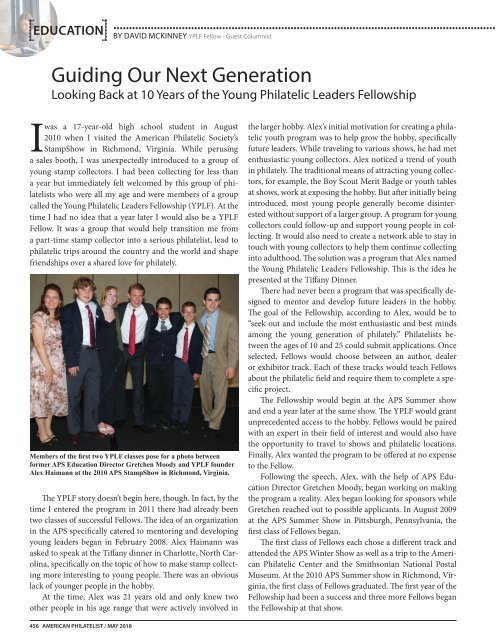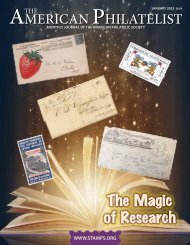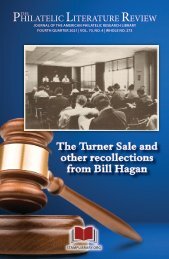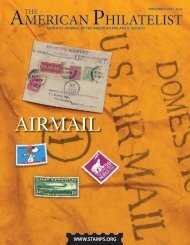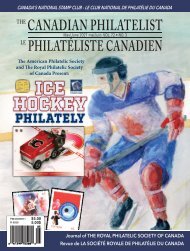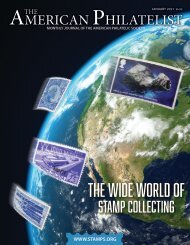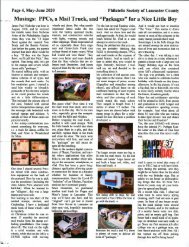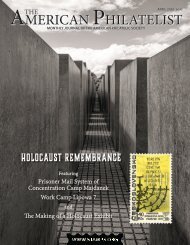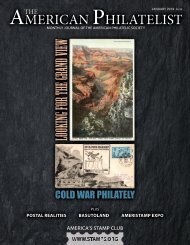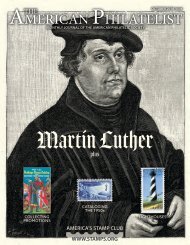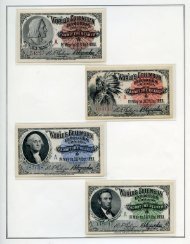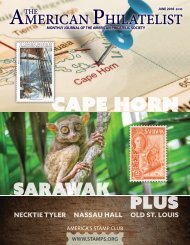The American Philatelist May 2018
- No tags were found...
You also want an ePaper? Increase the reach of your titles
YUMPU automatically turns print PDFs into web optimized ePapers that Google loves.
EDUCATION ...........................................................................................................................<br />
BY DAVID MCKINNEY YPLF Fellow - Guest Columnist<br />
Guiding Our Next Generation<br />
Looking Back at 10 Years of the Young Philatelic Leaders Fellowship<br />
I<br />
was a 17-year-old high school student in August<br />
2010 when I visited the <strong>American</strong> Philatelic Society’s<br />
StampShow in Richmond, Virginia. While perusing<br />
a sales booth, I was unexpectedly introduced to a group of<br />
young stamp collectors. I had been collecting for less than<br />
a year but immediately felt welcomed by this group of philatelists<br />
who were all my age and were members of a group<br />
called the Young Philatelic Leaders Fellowship (YPLF). At the<br />
time I had no idea that a year later I would also be a YPLF<br />
Fellow. It was a group that would help transition me from<br />
a part-time stamp collector into a serious philatelist, lead to<br />
philatelic trips around the country and the world and shape<br />
friendships over a shared love for philately.<br />
<br />
<br />
<br />
<strong>The</strong> YPLF story doesn’t begin here, though. In fact, by the<br />
time I entered the program in 2011 there had already been<br />
two classes of successful Fellows. <strong>The</strong> idea of an organization<br />
in the APS specifically catered to mentoring and developing<br />
young leaders began in February 2008. Alex Haimann was<br />
asked to speak at the Tiffany dinner in Charlotte, North Carolina,<br />
specifically on the topic of how to make stamp collecting<br />
more interesting to young people. <strong>The</strong>re was an obvious<br />
lack of younger people in the hobby.<br />
At the time, Alex was 21 years old and only knew two<br />
other people in his age range that were actively involved in<br />
the larger hobby. Alex’s initial motivation for creating a philatelic<br />
youth program was to help grow the hobby, specifically<br />
future leaders. While traveling to various shows, he had met<br />
enthusiastic young collectors. Alex noticed a trend of youth<br />
in philately. <strong>The</strong> traditional means of attracting young collectors,<br />
for example, the Boy Scout Merit Badge or youth tables<br />
at shows, work at exposing the hobby. But after initially being<br />
introduced, most young people generally become disinterested<br />
without support of a larger group. A program for young<br />
collectors could follow-up and support young people in collecting.<br />
It would also need to create a network able to stay in<br />
touch with young collectors to help them continue collecting<br />
into adulthood. <strong>The</strong> solution was a program that Alex named<br />
the Young Philatelic Leaders Fellowship. This is the idea he<br />
presented at the Tiffany Dinner.<br />
<strong>The</strong>re had never been a program that was specifically designed<br />
to mentor and develop future leaders in the hobby.<br />
<strong>The</strong> goal of the Fellowship, according to Alex, would be to<br />
“seek out and include the most enthusiastic and best minds<br />
among the young generation of philately.” <strong>Philatelist</strong>s between<br />
the ages of 10 and 25 could submit applications. Once<br />
selected, Fellows would choose between an author, dealer<br />
or exhibitor track. Each of these tracks would teach Fellows<br />
about the philatelic field and require them to complete a specific<br />
project.<br />
<strong>The</strong> Fellowship would begin at the APS Summer show<br />
and end a year later at the same show. <strong>The</strong> YPLF would grant<br />
unprecedented access to the hobby. Fellows would be paired<br />
with an expert in their field of interest and would also have<br />
the opportunity to travel to shows and philatelic locations.<br />
Finally, Alex wanted the program to be offered at no expense<br />
to the Fellow.<br />
Following the speech, Alex, with the help of APS Education<br />
Director Gretchen Moody, began working on making<br />
the program a reality. Alex began looking for sponsors while<br />
Gretchen reached out to possible applicants. In August 2009<br />
at the APS Summer Show in Pittsburgh, Pennsylvania, the<br />
first class of Fellows began.<br />
<strong>The</strong> first class of Fellows each chose a different track and<br />
attended the APS Winter Show as well as a trip to the <strong>American</strong><br />
Philatelic Center and the Smithsonian National Postal<br />
Museum. At the 2010 APS Summer show in Richmond, Virginia,<br />
the first class of Fellows graduated. <strong>The</strong> first year of the<br />
Fellowship had been a success and three more Fellows began<br />
the Fellowship at that show.<br />
456 AMERICAN PHILATELIST / MAY <strong>2018</strong>


